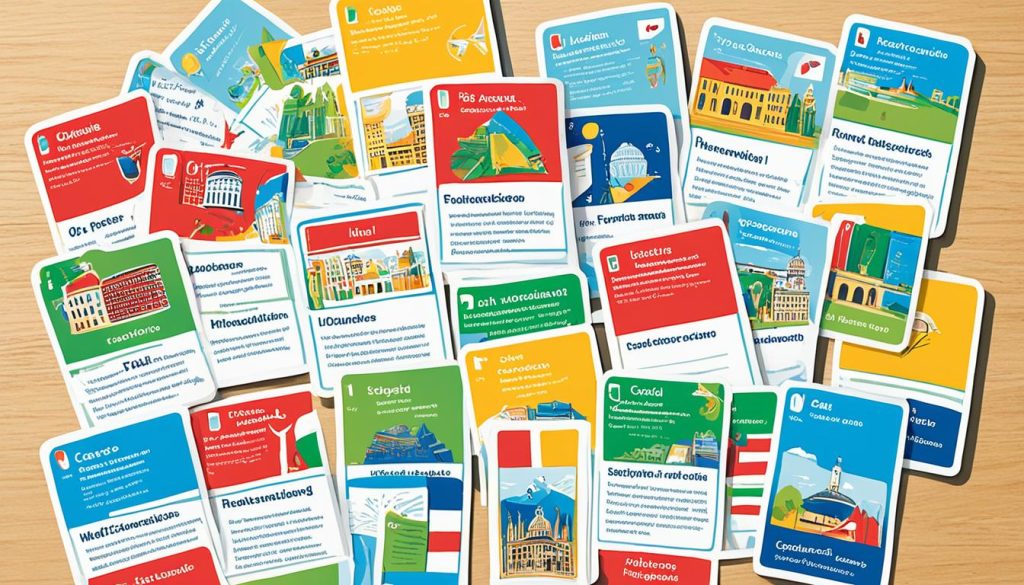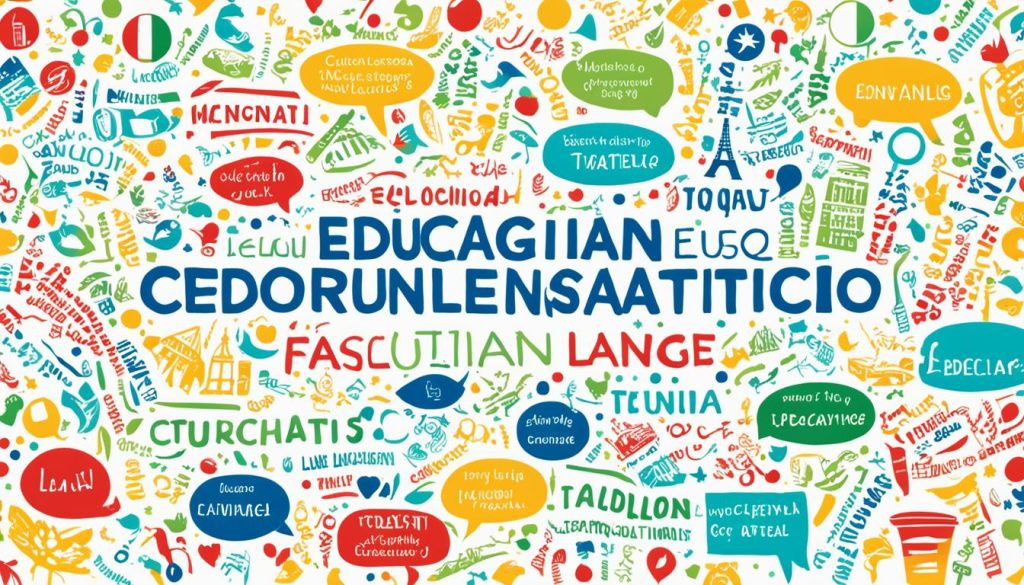Italy’s Education System is well-known for its depth and easy access. It’s a top spot for developing language skills. Educational programs here focus on multiculturalism. They suit many learners, making Italy a prime choice for language lovers and scholars.
- Exploring the Italian Education System
- Importance of Bilingualism in Italian Schools
- The Emergence of Language Centres in Italy
- Higher Education Prospects in Italy
- Italian as a Second Language: Teaching and Learning
- Language Exchange Programmes and Cultural Integration
- Private Tutoring and Personalised Language Services
- Online Education and Digital Language Learning
- Role of Government in Promoting Languages
- Challenges and Opportunities in the Italian Language Sector
- Integrating Immigrants through Language Education
- Education and Language Services for Expatriates
- Conclusion
In Italy, from sunny coasts to culture-rich cities, learning languages is key. Schools here uphold Italian language traditions. They also promote English and other global languages. This mix ensures effective learning for those wanting to boost their language skills in a vibrant cultural setting.
Exploring the Italian Education System
The topic of Italian Education is very interesting. It shows how Italy is shaping its future generations. We’ll look into how Multilingual Education and Education Reforms are playing a part in this.
The Structure of Italian Schooling
Italian schooling is structured in clear stages. It starts with pre-primary education for kids under six. Then, it moves to a five-year primary education.
After that comes three years of lower secondary education. Students can go on to upper secondary education, which can last five years. For those looking at college or vocational training, there are specific paths available.
The Role of Languages in Italian Education
Being multilingual is seen as key in today’s world by Italy. Early on, students learn foreign languages. This ensures they’re proficient in at least one extra language besides Italian, often English.
Recent Educational Reforms
Italy has made big changes to improve education through reforms. These changes aim to meet international standards and include digital skills. Such reforms show Italy’s commitment to bettering education for today’s challenges.
Importance of Bilingualism in Italian Schools
Bilingual education in Italian schools is now key to a complete learning atmosphere. It brings many benefits in thinking, social skills, and job chances. It compares old Italian teaching methods to the growing English-language learning in Italy.
Benefits of Being Bilingual in Italy
Learning two languages in Italy opens up many benefits. It makes students better at solving problems and handling many tasks at once. It helps them get along in different cultures with confidence. A study shows these skills improve schooling results and job options.
- Cognitive enhancement and greater executive brain function
- Social empathy and better cultural awareness
- Improved employment prospects domestically and internationally
Italian versus English Curriculum in Schools
Italian teaching is still important, but English is becoming more popular. This change is due to the need for English in global business and learning. Learning English prepares students for higher studies and improves their job chances. Groups like the British Council Italy highlight the importance of English for modern and competitive education.
- Impact of English on global academic success
- Interplay between Italian traditionalist perspectives and modern English-language demands
- Statistical improvements in student outlooks with access to bilingual curricula
This shows the strong position of bilingual education in Italy. It creates an educational system that is rich and full of opportunities for students.
The Emergence of Language Centres in Italy
In recent years, there’s been a big growth in Italian Language Centres. They help people learn Italian better and bring us closer in a multilingual community.
Language Certification and Standardised Testing
Certificates like CELI and CILS are key in Italy for showing how good someone is in Italian. They are given by respected places, like the University for Foreigners of Perugia, and match the CEFR standards.
- CELI – Certification of Italian as a Foreign Language
- CILS – Certification of Italian as a Second Language
These tests provide a clear way to see how well someone understands Italian.
Supplementary Language Courses for Students
There are extra courses for learning Italian outside of regular school. They’re offered by the University for Foreigners of Siena and other schools. The Itals’ Association of Language Schools works to make learning Italian in Italy better, giving more choices to students.
- Intensive summer language programs
- Part-time evening courses for working professionals
- Specialised language training for academic or professional needs
These extra learning options are flexible and tailored to fit each student’s needs as they dive into Italian language and culture.
Higher Education Prospects in Italy
Many students look abroad for higher education, and Italy is a top choice for many. With its deep roots in the arts and humanities, Italy is perfect for students eager to explore Italian Language Studies. Top schools offer courses that focus on the Italian language, along with critical and literary studies.
Italy is not just famous for arts. Its institutes are also celebrated for their role in International Education. They create a welcoming space for international students to dive into an enriched educational experience.
Universities Offering Language Degrees
Italy boasts many esteemed universities, like the historical University of Bologna, known for diverse language degrees. Whether it’s modern languages or ancient ones like Latin and Greek, there’s something for everyone. These courses not only teach fluency but also enrich students with the languages’ historical importance.
International Students in Italy
Italy’s study programmes are designed to attract global students with their rich mix of culture and rigorous academia. Italian universities provide excellent support to help international students adapt. The Ministry of Foreign Affairs and International Cooperation often steps in to offer scholarships and resources – making students feel right at home.
Italy is committed to being an international educational hub. It forms global partnerships, enhancing students’ learning and personal growth. Joining Italy’s educational programmes means joining an international network that prizes cultural understanding and language skills.
Italian as a Second Language: Teaching and Learning
Starting to learn Italian opens a door to Italy’s vast cultural world. A variety of Italian language courses cater to all skill levels. This highlights Italy’s commitment to top-notch language instruction.
Educational hubs like Società Dante Alighieri offer tailored language education strategies. Their dynamic approaches show the growth of Italian second language learning. These centers are beacons of language prowess in Italy.
- Teaching Methodologies
- Communicative approach to encourage conversational skills.
- Grammar-focused sessions for structural understanding.
- Audio-lingual activities that improve listening and speaking proficiency.
- Courses Available
- Intensive summer programmes for immersive learning experiences.
- Semester-long courses that combine language with cultural studies.
- Flexible online courses for distance learning options.
- Cultural Immersion
- Integration of cultural workshops to complement language lessons.
- Excursions to historical sites for contextual learning.
- Language exchange opportunities with local communities.
Language and culture are deeply connected. So, cultural immersion is key in Italian mastery. Language schools like ASILS pair with local governments. They create special study programs that ensure deep cultural and linguistic immersion.
Students get to dive into cultural festivals, enriching their education. Italy’s language teaching now mixes traditional and modern educational ways. This approach is ready to build a worldwide network of people skilled in Italian culture and communication.
Language Exchange Programmes and Cultural Integration
Today, promoting cultural exchange and improving intercultural competence are key. Italian institutions have launched many exchange programmes. These programmes boost language skills and help students from home and abroad with cultural integration. They create a perfect setting for students to experience diverse cultures. This leads to better learning and deeper connections.
Partnering with International Universities
Building international education partnerships means forming strong bonds with universities worldwide. For instance, the Erasmus+ programme. It lets students study abroad and experience new ways of learning and different cultures. These close relationships provide great benefits like joint studies, knowledge sharing, and research projects.
Cultural Sensitivity in Education Programmes
Cultural sensitivity is crucial in education, especially for programmes involving international students. Italian courses are specially designed to be culturally sensitive. They teach the Italian language and educate students about Italy’s cultural details and social norms. This prepares them to interact sensitively and respectfully in diverse cultural settings.
- Erasmus+ Programme: A conduit for academic and cultural knowledge exchange.
- The Fulbright Commission: Facilitating USA-Italy educational exchanges.
- Ministry of Foreign Affairs’ Initiatives: Promoting Italian culture and language through global partnerships.
These efforts have been fundamental in supporting cultural exchange and building international education partnerships. They play a big part in creating global citizens who are well-versed in intercultural competence.
Private Tutoring and Personalised Language Services
Learning a new language can be tough, but having a personal tutor changes everything. In Italy, experts in language training offer Personalised Tutoring that is simply unmatched. This is perfect for students and professionals who want to learn quickly. They get all the attention they need to improve their language skills fast.
Individual Attention to Language Learners
Everyone learns a language differently. In Italy, private tutors know this well. They provide Custom Language Solutions made just for you. Whether it’s business Italian or just chatting, their unique teaching methods are designed specially to meet your goals.
Customised Learning Plans for Professionals
If you’re a professional looking to thrive in the global market, Professional Language Courses can be a game-changer. These courses focus on vocabulary and communications that matter in your field. It’s not only about language, but also moving up in your career and engaging effectively worldwide.
- Flexible scheduling to fit your busy life
- Focus on using language in real professional contexts
- Lively learning methods that mirror actual business situations
The Italian Chamber of Commerce and other organisations lead in offering these dynamic language programs. They help professionals advance in their careers by mastering multilingual communication skills.
Online Education and Digital Language Learning
Online learning has changed how we learn languages. It uses technology to make lessons accessible to all. Now, you can learn a new language without worrying about where you are. In Italy, innovative learning options are growing quickly. They offer many ways to learn that fit different needs.
eLearning Platforms in Language Education
Italian online learning sites are leading this change. They have courses for all kinds of learners. These sites let you learn anytime, fitting even the busiest schedules.
These digital sites do more than just teach. They offer a wide range of courses, from beginner to advanced. Learners can gain language skills for daily life and work. Plus, they offer a community. This means you get feedback and support as you learn.
Advancements in Language Learning Technology
New technology has changed how we dive into languages. Now, we have interactive apps and even virtual reality. These tools make learning active and help you remember what you learn.
Italy’s Ministry of Innovation wants to keep technology in learning top-notch. Start-ups are always bringing in new tools. These tools add to old ways of learning and bring new ways to explore languages.
Digital and traditional learning together offer a unique way to learn languages. Live sessions online mimic being in a class. At the same time, you can learn at your own pace with online modules. Digital tools make learning easier to access and improve how well you learn.
Role of Government in Promoting Languages
The Italian Government plays a key role in enhancing language learning. They focus on Funding for Language Education, strong Education Policies, and support for Language Development. This boosts Italy’s language skills, culture, and economy.
Funding and Subsidies for Language Learning
The Italian Government helps more people access language education through funding and subsidies. The Ministry of Education believes this funding is key to a multilingual society. It provides scholarships and grants for students studying languages, showing strong government support.
National Language Policies and Initiatives
Italy’s Education Policies aim to make its society multilingual. These policies include language learning in the national curriculum. They focus on Italian and other major languages. Language Development Initiatives and the European Language Label encourage innovative teaching. They support continuous language learning, helping Italians succeed globally.
Challenges and Opportunities in the Italian Language Sector
Mastering a language comes with its set of Language Education Challenges. In Italy, people face issues like limited access, ensuring quality, and using new tech in teaching. But, there are also many Language Teaching Opportunities. These offer hope to both teachers and students.
The interest of Italians in learning global languages such as English and Chinese is growing. This trend is pushing growth in the Language Services Market. The National Association of Language Companies (ANILS) highlights this, showing areas ripe for innovation.
- Ensuring wide-reaching access to language learning resources irrespective of socioeconomic backgrounds.
- Striving for uniform excellence in language instruction across various regions and institutions.
- Adopting modern, tech-driven pedagogies that resonate with today’s digital natives.
Italian Universities and Research Centres are busy researching. They look into how effective current teaching methods are and how to include new tools. Their work helps make language education better for the future.
Market studies show high demand boosts the language education and services sectors. With globalisation, international trade, and booming tourism, knowing languages is key. This makes the educational field even more vital.
Looking ahead, we see that challenges and opportunities in Italian language learning are linked. Improving language education helps with personal growth and has wider benefits. It aids societal and economic progress in Italy and elsewhere.
Integrating Immigrants through Language Education
The Italian educational system is taking big steps to help immigrants blend in. It’s launching Immigrant Language Integration initiatives. These language programs play a key role in helping newcomers become part of Italian society’s diverse community.
Initiatives for Immigrant Language Support
Italy is running several programs to support Multicultural Education. These include government and NGO projects. The Integration Agreement is important, making language skills a must for staying in Italy. Groups like the Italian Red Cross offer key language help to immigrants.
- CIDIS initiatives tailored to immigrant communities
- Local councils offering orientation and language courses
- Cultural associations promoting societal integration through language
Assessing Language Proficiency for Newcomers
Assessing language skills is a crucial first step for immigrants. This Language Assessment checks how well people understand Italian. It helps plan the right language course and spots where extra help is needed. These checks are vital for matching education to Italy’s growing diversity.
- Standardised tests defining language benchmarks
- Personalised assessments by qualified language experts
- Continual evaluation to tailor progressive education strategies
Structured language learning is helping immigrants adjust and succeed. It makes moving to a new culture easier. And it lets them add to and flourish within the wider community.
Education and Language Services for Expatriates
Families moving to Italy look for good schools for their kids first. There are top international schools in Italy for expatriate children. They offer curricula that meet expat education needs. This makes it easier for kids to adjust to a new culture. The expat community helps too, offering lots of support services.
International Schools and Their Curricula
International schools in Italy have programs like the International Baccalaureate (IB), British GCSEs, and A-levels. These meet the education needs of expat children. The IB program is known worldwide. It focuses on critical thinking and understanding different cultures. Schools linked to the Association of British International Schools in Italy (ABISI) focus on the British curriculum. This reassures parents about maintaining education standards they are used to.
These schools prepare students for global university requirements. This means students can easily move to another country without falling behind in their studies.
Support Services for Expatriate Families
Moving abroad involves more than just a new place. It’s about getting used to a new culture and education system. In Italy, expat support services help with more than school. They help families with everyday life in a new country. There are language courses, cultural programs, and information about the local education system. These services are crucial for families moving in and out of Italian schools.
There are also active expat online forums and social groups. They share useful tips and stories. This makes settling in easier for everyone. Italy’s international schools and support networks focus on making expat families feel welcomed. They help families do well in school and enjoy their new life.
Conclusion
The complex role of education and language in Italy has been thoroughly discussed, showing the country’s commitment to Education and Language Growth. Italy’s education system and its language centers show its aim to build a Multilingual Society. This goal is about more than just teaching; it’s also about enriching culture. Italy is a place where language preserves traditions and connects people globally.
Italy offers a chance to learn throughout life, blending old traditions with new ideas. It encourages people to explore Italian language and culture. This is important for enhancing oneself and advancing in careers. Education leaders support this approach, seeing its benefits for the whole society. Learning languages opens doors to new possibilities and opportunities.
There is excitement about the future of education technology in Italy. Education experts and global advisors look forward to new teaching methods. These changes are promising for everyone in education. They hint at a time ahead where learning combines traditional methods and new technologies. This mix will lead to greater achievements in education and language skills.
























